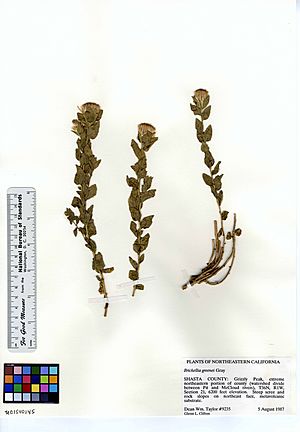Greene's brickellbush facts for kids
Quick facts for kids Brickellia greenei |
|
|---|---|
 |
|
| Scientific classification | |
| Kingdom: | |
| (unranked): | |
| (unranked): | |
| (unranked): | |
| Order: | |
| Family: | |
| Subfamily: |
Asteroideae
|
| Tribe: |
Eupatorieae
|
| Genus: |
Brickellia
|
| Species: |
B. greenee
|
| Binomial name | |
| Brickellia greenee |
|
| Synonyms | |
|
Coleosanthus greenei (A.Gray) Kuntze |
|
Brickellia greenee is a type of flowering plant. It is commonly known as Greene's brickellbush. This plant is part of the daisy family, also called Asteraceae. You can find it growing in the mountain ranges of southwestern Oregon and northern California.
Contents
About Greene's Brickellbush
Greene's brickellbush is a plant that comes back every year. It grows from about 20 to 50 centimeters tall. That's like 8 to 20 inches. It has several stems that feel sticky and have tiny glands. These stems are covered with leaves.
What It Looks Like
The leaves of this plant are oval-shaped. They have small teeth along their edges. Each leaf can be up to 3 centimeters long, which is about 1.2 inches. They are also sticky because they have special resin glands.
Its Flowers and Seeds
The plant produces groups of flowers called inflorescences. These hold flower heads that are spaced out. Each flower head is about 2 centimeters long. They are surrounded by narrow, pointed leaf-like parts called phyllaries.
Each flower head has about 60 tiny, thread-like flowers. These are called disc florets. After the flowers bloom, the plant makes a fruit. This fruit is a hairy, cylinder-shaped achene. It is about 7 millimeters long. The achene also has a fluffy top made of bristles, which is called a pappus. This pappus helps the seeds float away in the wind.
Who Was Edward Lee Greene?
This plant is named after an American botanist. His name was Edward Lee Greene. He was born in 1843 and passed away in 1915. Botanists are scientists who study plants.

